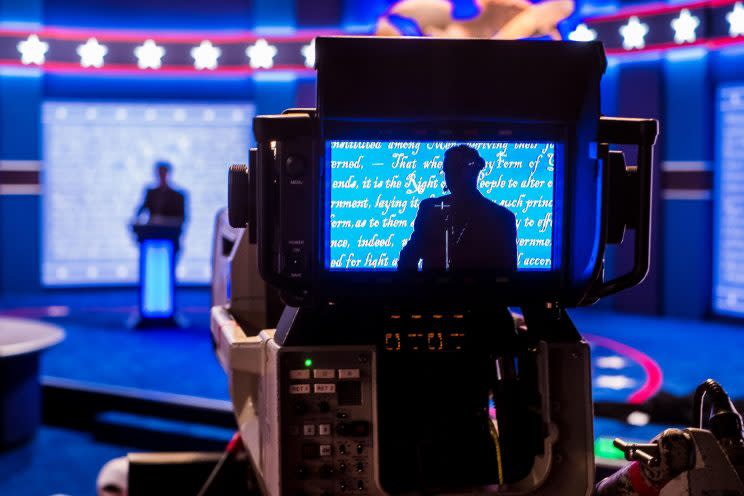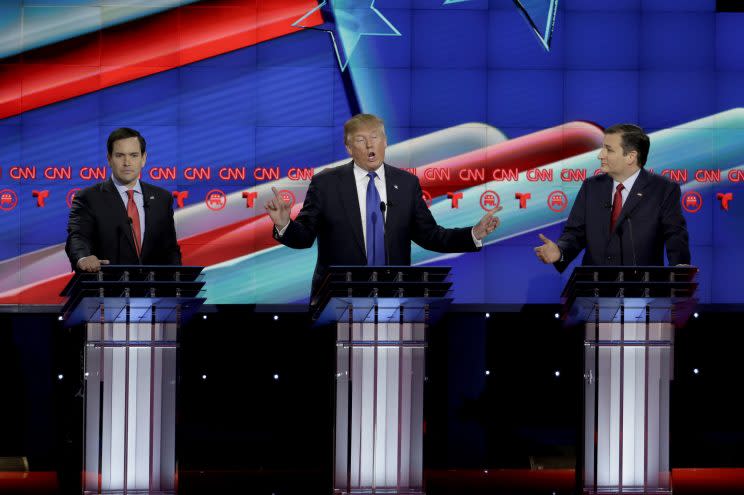Donald Trump’s new campaign-trail discipline is about to be tested at debate
Donald Trump has long bragged he can act presidential if he wants to. And, over the last month — with a few exceptions here and there — the celebrity businessman set aside his stream-of-consciousness way of politicking in favor of a more controlled message on the stump.
But Trump’s newfound discipline faces its first significant test on Monday as he joins rival Hillary Clinton for the first time on the debate stage in what could be a make-or-break moment in his unlikely bid for the presidency.
The reality star turned Republican presidential nominee has enjoyed a rise in the polls in recent weeks, as he has campaigned almost exclusively with the aid of a teleprompter loaded with carefully vetted remarks. Yet on the debate stage, it will be up to Trump alone to prove he can stay on message long enough to make a good impression on voters who polls suggest are skeptical of his temperament and ability to lead the country.
Trump being Trump, the GOP nominee has approached the first of three scheduled debates against Clinton in a wholly unconventional manner. Unlike other candidates — including his Democratic rival — who have locked themselves away for days at a time to prepare for a political standoff that often defines the trajectory of the final weeks of the election, Trump has downplayed his own debate approach, insisting he wants to rely more on his gut instincts on the debate stage.
“I believe you can prep too much for those things,” Trump told the New York Times last month. “It can be dangerous. You can sound scripted or phony — like you’re trying to be someone you’re not.”
According to two Republican sources familiar with his debate preparations, Trump rejected overtures from several longtime GOP hands who have worked with nominees in the past on debate performance, insisting his successful debates in the primary proved he didn’t need the help. Instead, Trump has focused on a more casual, freewheeling lead-up to the debates. His practice sessions, primarily involving his inner circle of advisers, began only a few weeks ago.

Slideshow: Preparations for the presidential debate at Hofstra University >>>
While Clinton reportedly began preparing for the debates months ago and has spent several days off the trail last week ahead of Monday’s face-off, Trump has devoted little time by comparison. Trump, on the road six days a week, has spent most of the last few Sundays off the campaign trail at his golf course in Bedminster, N.J., where he has talked policy and strategy with a mix of close aides and confidants.

Among those in the loop have been top aides Kellyanne Conway, Steve Bannon, David Bossie and Stephen Miller, as well as his son-in-law Jared Kushner. Former New York City Mayor Rudy Giuliani, New Jersey Gov. Chris Christie and former House Speaker Newt Gingrich have also weighed in — as have media personalities, including former Fox News chief Roger Ailes and conservative commentator Laura Ingraham, according to sources close to the campaign.
His preparations were decidedly informal. They were usually held over lunch and with a television on nearby, allowing the candidate to constantly monitor the news. While his staff repeatedly tried to sway him, Trump refused to participate in mock debates against a stand-in for Clinton — though in recent days, the candidate did relent and begin practicing answers to possible questions.
At the same time, he has not been paging through large binders of policy to prepare for whatever questions could come his way. Instead, Trump has preferred to talk over policy issues with Miller and other advisers, focusing intently on foreign policy, given Clinton’s experience as secretary of state. But some Republicans privately fretted over whether that was enough, especially with Trump’s less-than-stellar command of policy details on the trail so far.
While Trump resisted coaching on the mechanics of the debate, aides have been trying to guide him on style. They urged Trump, a candidate who has been verbose and often unfocused, to deliver shorter answers, packed with potential sound bites to fit into the time limits at the debates.
A candidate who has bragged about his instinct be a “counter puncher” if he is attacked, Trump became known for his withering one-liners in the debates against his primary rivals and seems unlikely to rein it in. But with an eye on swing voters already wary of Trump’s temperament, aides have been trying to coach the GOP nominee to exhibit more self-control and to maintain some level of cool in response to Clinton’s expected attacks.

In the past, Trump has suggested anything is on the table, including former President Bill Clinton’s sex scandals. On Saturday, he suggested he might invite Gennifer Flowers, who claimed to be Clinton’s longtime mistress, to the debate — only to have aides say she wasn’t actually invited. The quip came after Trump told Fox News’s Bill O’Reilly that he would likely refrain from personal attacks.
“I don’t know what I’m going to do exactly,” Trump said of Clinton. “It depends on what level she hits you with — if she’s fair, if it’s unfair, but certainly I’m not looking to do that. … If she treats me with respect, I will treat her with respect.”
But, he added, “It really depends. … You’re going to have to feel it out when you’re out there. She’s got to treat me with respect. I’m going to treat her with respect. I’d like to start off by saying that because that would be my intention.”
One major challenge for Trump will be the different format. Unlike the primaries, Monday’s debate is 90 minutes with no commercial breaks, giving the candidates no time to pause and refocus. That could be tricky for Trump, who has been visibly exhausted at rallies in recent days.
Trump has also been a candidate who very much feeds off the energy of the crowds at often raucous rallies. To prepare him for the more subdued setting of the more formal debate, his aides in recent weeks scheduled campaign events in smaller venues before skeptical audiences, including recent visits to black churches in Detroit and Flint, Mich., to prepare him for an atmosphere in which applause is decidedly limited.
Heading into Monday, the Clinton campaign and other Democrats have voiced anxiety about whether Trump could benefit from low expectations of his performance against Clinton, a policy wonk who is a veteran of the debate stage. And already, Trump has seemingly tried to brace for a bad performance by attacking the debate moderators, including NBC’s Lester Holt, suggesting the media won’t be fair to him.
Earlier this month, amid calls for moderators to more aggressively call out inaccurate statements by the candidates, Trump suggested that the media was “gaming the system” against him at the debates.
Still, for all the apparent lowering of expectations, Trump surrogates were out in force praising his debate skills on Sunday — even as they said the candidate hadn’t participated in normal debate prep.
“He’s a brilliant debater,” Conway told ABC’s “This Week.” “Newt Gingrich put it best. The former speaker recently said Donald Trump is the best debater he’s ever seen. He’s like the Babe Ruth of debating. He really shows up and swings and does a great job.”
_____


